SEVEN KALIMAHS (FORMULAS)
OF ISLAMIC FAITH
Translation by Hafiz Dr. Mohammad Adil M.A., LL. B. Ph.D.
I seek refuge with Allaah from Satan, the Rejected one.
In the name of Allaah, the All-Compassionate and the Most Merciful.

We praise Him (Allaah) and beseech His blessings for the Honoured Messenger.
The Muslims of present day are fond of acquiring knowledge of sciences and arts for prosperity in worldly pursuits. Parents would do anything to afford their children the best opportunities for education. Such trends have brought about a general awakening to the benefits of modern education. In this general stampede towards temporal knowledge, somehow the moral and spiritual values of our heritage have come to be forgotten and unless corrective action is taken in good time, there is a grave danger of them being ignored altogether. It is a pity that many an educated person in the modern sense can hardly recite correctly the Kalimah Taiyyaba - the first principle and essential requisite of Islam, while a proficient knowledge of the Do's and Don'ts of Islam is a far cry.
We shall provide, in installments, English translation of the seven Kalimahs of Islam (Formulas of Faith) based on Ahadith - Sayings of the Holy Prophet (S.A.W.) with brief notes on each, so as to make them easy for all to remember and recite as many times as possible every day.
We pray to Almighty Allaahto brighten our hearts with the light of Imaan (Belief) - Faith in Allaahand in finality of the Holy Prophet Muhammad (S.A.W.) May Allaahbless us all with longing for knowledge of our Religion, and practice of virtuous deeds, to gain admittance into the Presence and Pleasure of Allaah, the All-Compassionate, the Most-Merciful. Ameen!
THE FIRST KALIMAH
KALIMAH TAIYYABA
Declaration of Faith in Islam

Laa ilaa-ha il-lal-laah Muham-ma-dur-ra-soo-lul-laah.
"There is no God but Allaah and Muhammad is Allaah's Messenger"
It is the first of the seven Kalimahsand the foremost of the essential requisites of Islam. It is also known as Kalimah-i-Iklaas - the Word of Pure Adoration. By reciting the Kalimah with heart-felt acceptance, one formally enters the fold of Islam and becomes entitled to Paradise. It is a key to Paradise, and virtuous actions are the unlocking teeth and grooves of that key. Frequent recitation of Kalimah Taiyyaba enlightens the heart and provides the means for attainment of Divine pleasure.
THE SECOND KALIMAH
KALIMAH-TUS SHAHADAT
Declaration of Submission of Evidence

Ash-ha-du an laa ilaa-ha il-lal-laa-hu wah 'da-hoo laa sha-ree-ka la-hoo wa ash-ha-du an-na Mu-ham-ma-dan 'ab-du-hoo wa ra-soo-luh
I bear witness that none is worthy of worship but Allaah Who is The One and Only without partner, and I bear witness that Mohammed is His servant and messenger.
The recitation of the Kalimah in the morning and evening brings Divine Blessings, especially for one who recites it after Wuzoo (Ablution for daily prayers -Salaat) and spends his time in seeking virtue and the pleasure of -Allaah. The eight gates of heaven will be thrown open for him to enter Paradise through any one he may choose.
THE THIRD KALIMAH
KALIMAH-UT-TAMJEED
Declaration of The Glory of Allaah
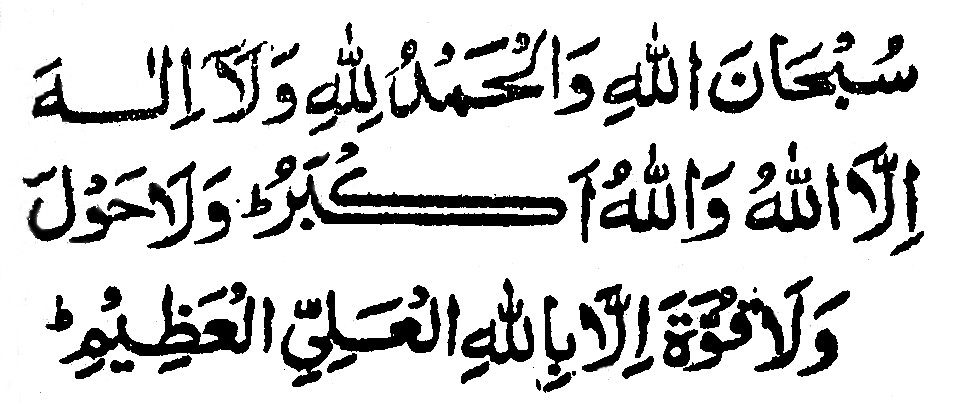
Sub-haa-nal-laa-hi wal-ham-du lil-laa-hi wa laa-i-laa-ha il-lal-laa-hu wal-laa-
hu ak-bar. Wa laa hau-la wa laa quw-wata il-laa bil-laa-hil 'aliy-yil-'a-zeen.
Glory be to Allaah and praise be to Allaah: there is no god but Allaah: Allaah is Most Great: there is no power, no strength save in Allaah, The Most High, The Great.
The Kalimah has two parts. The sayings of the Holy Prophet Muhammad (S.A.W.) mention the two parts separately also. The FIRST part is -

Its transliteration and translation have been given in italics, respectively small and capital letters.
It is a declaration of glory of God on the part of a believer and of gratitude for His bounties. It is also an affirmation of Oneness of God, with due praise and adoration, and of His greatness. Because of these attributes it is names as Kalimat-ut-Tamjeed.
The SECOND part of the Kalimah is -

It is in itself a complete Kalimah also which may be called Kalima-i-tawakkul - Article of Faith & Trust in God. When a believer recites it, he leaves all of his affairs to God Who is pleased thereby and takes upon Himself to ensure the reciter's success in his good endeavours and for his protection against all losses and to relieve him when in distress or worried. In the sacred books of Ahaadith, its virtues have been highly praised. It is one of the treasures of Heaven directly under the Throne of the Almighty. It is a panacea for ninety nine ailments. Particularly it is the best anecdote for all the troubles of the heart as also for the evil thoughts, doubts and disbelief that arise therefrom. It is the best means towards the snares of Satan. In the sacred sayings of the Holy Prophet, the Kalimah is mentioned in several different versions.
THE FOURTH KALIMAH
KALIMAH-TUT-TAUHEED
Declaration of the Oneness of Allaah
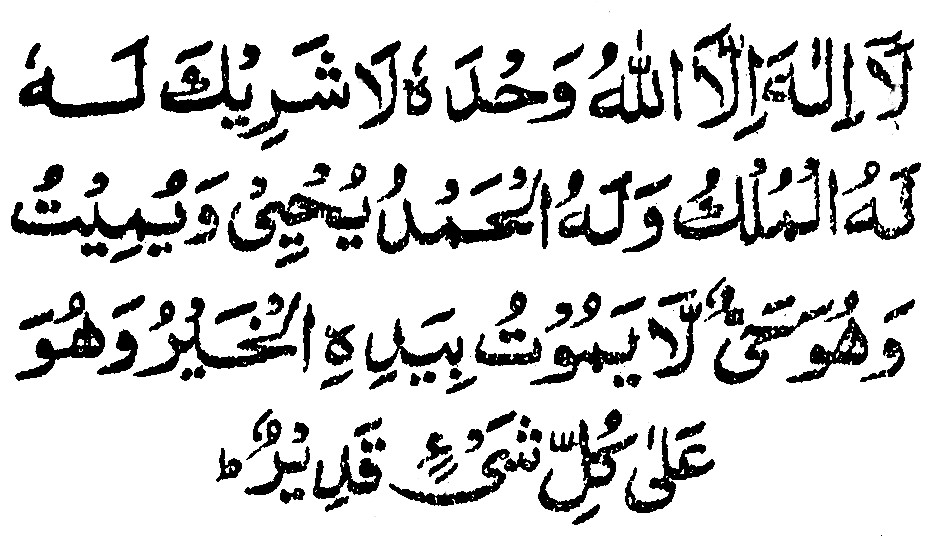
.
-----------------------------------------
Laa-ilaa-ha il-lal-laa-hu wah-da-hoo laa sha-ree-ka la-hoo la-hul-mulku wa la-hul-ham-du yuh-yee wa yu-meetu wa hu-wa haiy-ul-laa ya- moo-tu bi-ya di-hil-khai-ru wa hu-wa 'a-laa kul-li shai-in qa-deer.
"There is none worthy of worship but Allaah; He is all by Himself and has no partner ( in the whole universe). His is the Authority and unto Him is due All Praise; He gives life and He causes death. He is Ever Living and shall never cease to exist. On His Hand is all good, and He has power over all things."
Regular recitation of this Formula ensures remission of acts of omission and commission, elevation of the reciter's spiritual rank, and protection against promptings and temptations from Satan. If one continues to recite this Kalimah while shopping or passing through a market place, Allaah the Almighty grants him reward of a million virtuous deeds, forgives a million of his minor sins, raises his spiritual rank by an equal number of times, and entitles him to a place in Paradise.
THE FIFTH KALIMAH
KALIMA-TU RAD-DI KUF-RI-WASH-SHIRK
Rejection of Atheism and Idolatry
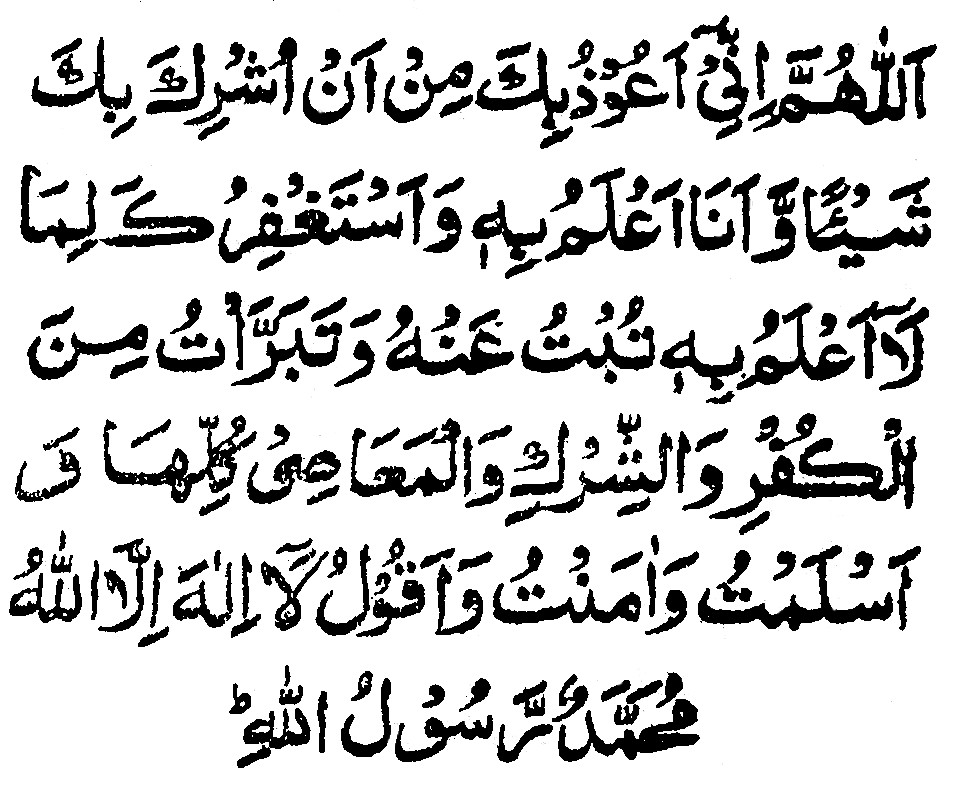
Al-laa-hum-ma in-nee 'a-oo-zu-bi-ka min anush-ri-ka bi-ka shai-anw-wa ana 'a-la-mu bi-hee wa as-tagh-fi-ru-ka li-maa laa 'a-la-mu bi-hee tub-tuu 'an-hu wa ta-bar-ra'-tu mi-nal-kuf-ri-washshir-ki wal ma-'a - -seekul-li-haa wa as-lamtu wa aa-man-tu wa a-qoo-lu laa-il-ha il-lal laa-hu Mu-ham-ma-dur-ra-soo-lul-laah.
"O Allaah! I do seek refuge with Thee from ascribing any partner with Thee knowingly, and I implore Thee for Thy forgiveness from sins from which I am unaware. I apologise from all this and I abhor atheism, idolatory and all kinds of sins, and I am an obedient follower and a sincere believer and I declare with heartfelt believe that there is no God but Allaah and that Muhammad (S.A.W.) is the Messenger of Allaah."
This is not found in the books of Ahaadith: with its text as above; it has been put together from the text given in different Traditions.
When a person recites this auspicious Kalimah and seeks refuge with Allaah in order to save himself from infidelity, idolatry and all other major sins, Allaahthe Master of all Glory, takes such a person under His protection. The Holy Prophet (S.A.W.) instructed Hazrat Abu Bakr Siddique (R.A.) that if he was to recite the under-mentioned part of the Kalimah thrice every day, Allaahthe Exalted, will keep him away from all types of polytheism.
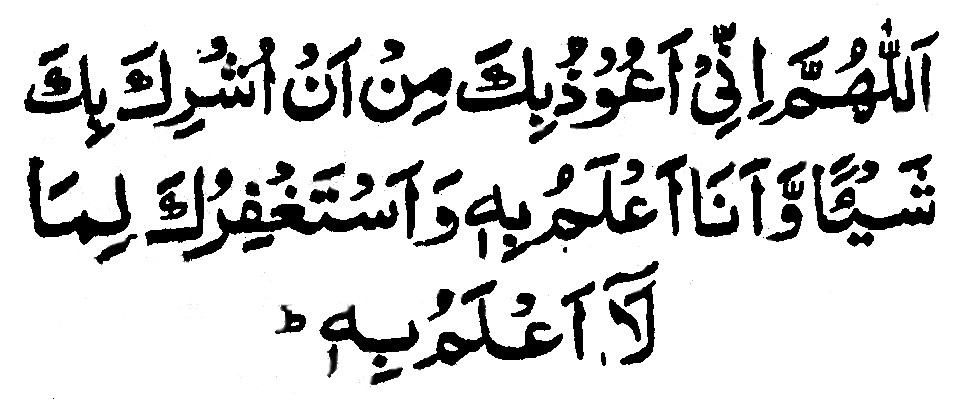
The transliteration and translation of the above portion of the Fifth Formula have been given above in italics, respectively in small letters.
THE SIXTH KALIMAH
KALIMA-TUL-ISTIGHFAAR
Words for Beseeching Forgiveness of Allaah

As-tagh-fi-rul-laa-hal-lazi la ilaa-ha il-laa hu-wal-Haiy-ul Qaiy-yoo-mu wa a-too-bu i-laih.
I seek forgiveness of Allaah. There is no God but He, the Living, the Self-subsisting Sustainer. His Pardon do I beseech.
It is the most eminent of the Kalimahs which occur in Hadith for the purpose of asking forgiveness of Allaah. Its recitation ensures remission of all sins, though they may equal the foam and froth of the sea. Even the sin of a deserter from a battle between the forces of Islam and those of the infidels is pardoned if he were to recite this Kalimah and beg pardon from Allaah with a firm determination and sincere repentance never again to repeat his act of default. It is also said that this Kalimah includes Ism-i-Azam - the most sublime name of Allaah.
Istighfaar means imploring forgiveness from Allaah for sins committed and tauba is a promise not to repeat the sin. To implore forgiveness for one's sins and to make a sincere promise not to repeat them. absolve one of all sins completely. A penitent heart is full of peace and tranquility, its burden is lightened and it becomes the recipient of the pleasure of Allaah:
The Principal Affirmative Formula for Craving Mercy from Allaah:
It is mentioned in the sacred book of Hadith (Bukhari) that Hazrat Shaddad bin Aus (R.A.) reported that the Holy Prophet Muhammad (S.A.W.) said,
"The most eminent recitation for imploring forgiveness from Allaah is -
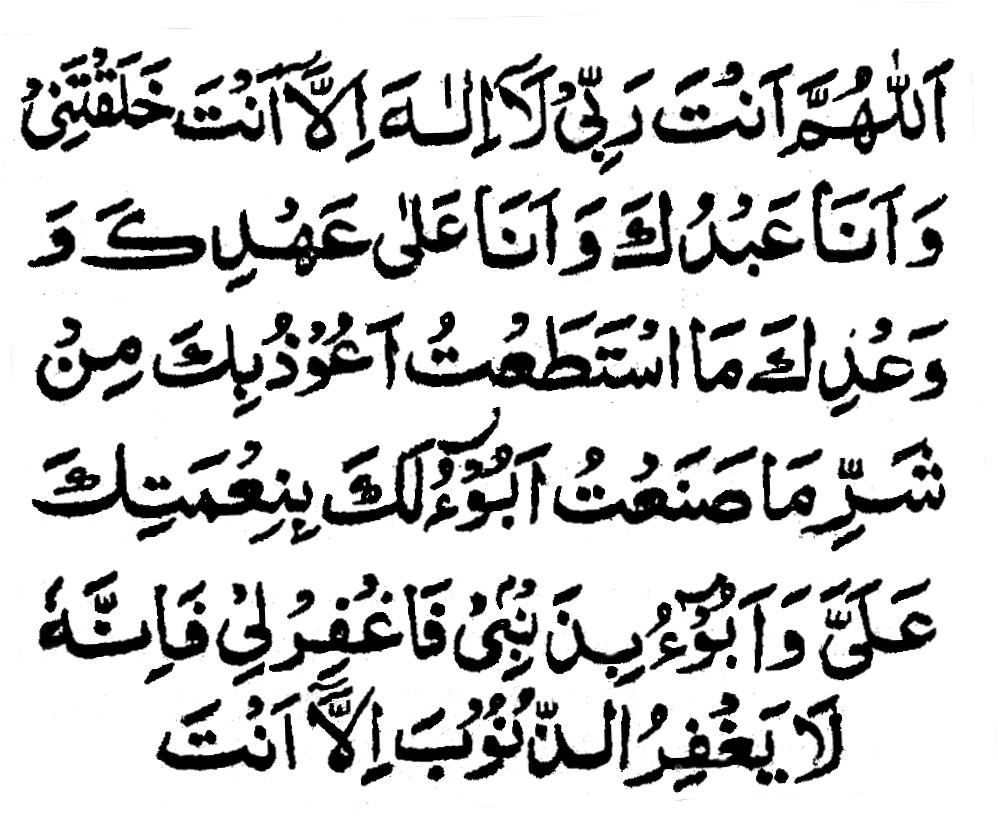
Al-laa-hum-ma anta Rabbi laa ilaha illaa anta. Khalaqtani wa ana 'abduka wa ana 'alaa 'ahdika wa wa'dika masta ta'tu Auzubika min Sharrima Sana'tu Abu-o-laka bi-ni' matika 'alayya wa abu-o bi-zambi Faghfirli fa in-nahu laa yaghfir-uz-zunooba illa anta.
"Ya Allaah! Thou art my Guardian Lord. None is worthy of worship except Thself. Thou have created me and I am Thy servant. I adhere to my covenant with Thee and keep my promise to Thee to the best of my capacity. I seek Thy Refuge and Protection from all the evil that I have committed. I admit the Blessings Thou hast bestowed on me and confess my guilt. Therefore, pardon me as none in truth can forgive sins except Thyself."
The Holy Prophet Muhammad (S.A.W.) has said:
"If a person having full faith that Allaah the Exalted will pardon his sins, were to make the above supplication in the morning and to die before sunset, that person will go to Heaven; and if a person were to recite it during the night, with the same belief, and breathe his last before sunrise, he will also be admitted to Paradise."
THE SEVENTH KALIMAH
IMAAN MUJMAL AND IMAAN MUFASSAL
Words of Islamic Faith in Brief and Words of Islamic Faith in detail.
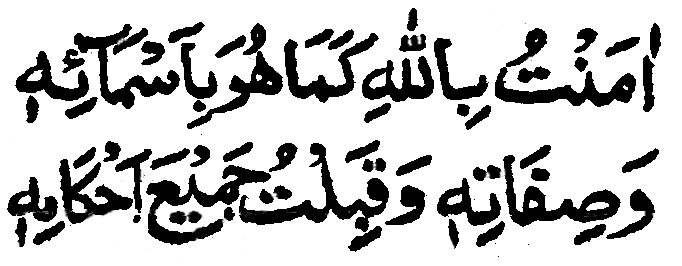
Aa-man-tu bil-laa-hi ka-ma hu-wa bi as-maa-i-hee was si-faat-i-hee wa qa-bil-tu ja-mee-'a ah-kaa-mi-hee.
I believe in Allaah, The Most High, as He is with all His Names and Attributes, and I accept all His Commands,
By recitation of these words a person declares his faith (Imaan) in Allaah, believing that all of His Names are exalted and that all the good attributes belong to Him and befit Him. He is above and free from all shortcomings. Further, that he accepts all of His Commands which have reached him through the Holy Prophet Muhammad (S.A.W.)
IMAAN MUFASSAL
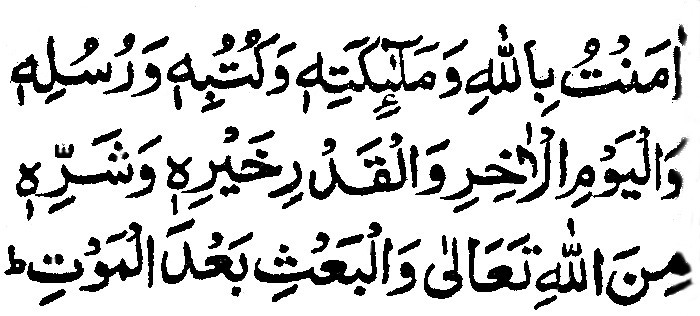
Aa-man-tu bil-laa-hi wa-ma-laa-i-ka-ti-hee wa ku-tubi-hee war ru-su-li-hi wal-yau-mil aa-khi-ri wal-qaa-ri khai-ri-hee wa shar-ri-hee mi-nal-laahi ta-aa-la wal-ba-'si ba'-dal maut.
I believe in Allaah, His angel, His books, His messengers, the Day of Judgment, the measure of good and evil as determined and ordained by Him, and resurrection after death.
Through recitation of the above auspicious Kalimah a person accepts all the seven fundamental beliefs of Islam which have been repeatedly mentioned in different verses of the Holy Qur'aan and the sacred books of Hadith (Sayings of the Holy Prophet Muhammad (S.A.W.). A brief exposition of the seven fundamentals appears below:
(1) Belief in Allaah: It means that one should believe that Allaah, the Exalted, is One, Holy, Perfect without defect, and none is like Him. He has created human beings and all the worlds, the earth and the heavens, and all that exists. He is all ALONE without partner, parents or progeny. He is the Creator and has complete control over life and death of all that He had created. All are dependent on Him while He depends on none. He can do what He wills - none can deter Him from making His decisions. He is the Omnipotent. He is All Hearing and Seeing. He is the Master of the earth and of the heavens and all that is contained between them. He is the Lord of the treasures of all the hidden knowledge - none can come to know of the unknown without His permission. He is thus The Knower of what is hidden, and what is open, the ins and the outs. Worship of and obedience to Allaah is obligatory for all, none is worthy of the same except Him. All Praise and Adoration belong to Him. He is The Exalted, The Great and The Eternal.
(2) Belief in the angels: It means that angels are created by Allaah from light. They cannot be seen by us. They are neither males nor females. They are obedient to Allaah - the Master of the worlds. They dare not disobey His Commands, whatever duty is entrusted to them either for worship and adoration or administration of the Universe. They carry out the Will of Allaah most meticulously and obediently.
The exact number of angels is known to Allaah alone. The exalted among them are four. The most honoured and intimate, appointed by Allaah for most important duties are -
" Archangel Gabriel (alaihis salaam): entrusted with the duty of delivering revelation from Allaahto His Messengers,
" The second Archangel - Michaeel (alaihis salaam) - is entrusted with arrangements for bringing down rain and supplying provisions for Allaah'screation.
" The third is Archangel Asrafeel (alaihis salaam) who is to sound the Soor (Trumpet) on the Day of Resurrection - the Day of Final Accountability.
" Lastly, the fourth Archangel - Izraiil (alaihis salaam) - is assigned the duty of taking life at the destined hour of death.
(3) Belief in the Books of Allaah. It means to believe in all the revealed Books of Allaah, given to several of His Prophets for guidance of mankind. The books of smaller contents are called Scriptures. Four of the prominent Books are well known, namely (1) Taurait (Torah - The Old Testament), (2) Zaboor (The Psalms), (3) Injeel (The New Testament) and (4) Qur'aan Majeed. The four Books were revealed by Allaah, the Lord of all Reverence to the four great messengers of His -
" - Taurait was revealed to Hazrat Moosa (Moses - alaihis salaam),
"
- Zaboor to Hazrat Dawood (David - alaihis salaam),
"
- Injeel to Hazrat Iisaa (Jesus - alaihis salaam) and
"
- Qur'aan Majeed - the last Book of Allaah - to the last and most revered Prophet Muhammad (S.A.W.).
Before Qur'aan Majeed, it was incumbent upon all to act upon the revealed Book of their Prophet during his period, but after the revelation of Qur'aan Majeed, which contains all the fundamental and basic commandments mentioned in other revealed Books of Allaah, it is now necessary for everyone to believe in and act upon the teachings of Qur'aan Majeedand to hold the other revealed Books of Allaah as true in their origin.
(4) Belief in the Messengers of Allaah. It means that Allaah the Exalted sent Messengers (ambiyaa - plural of Nabi) conveyors of Divine Guidance chosen for the Mission. All of them were the most faithful servants and true Messengers of Allaah, who conveyed to their people the commandments revealed to them without addition or alteration. They spoke the truth. They were of noble nature and never did they commit any sins, and all their actions were completely according to the Will and Commandments of Allaah. It is thus obligatory for everyone to pay respect and honour them. Allaah, the Exalted, had sent Ambiyaa, conveyors of Divine Guidance without a formal and a new code of Shariat - all of them followed the Right Path. In the matter of prophethood all the Prophets are equal but they differ in excellence due to certain preferences granted by the Almighty Allaah to some of them over the others. The highest excellence was granted by Allaah to the Prophet Muhammad (S.A.W.), who did not receive his instruction from any one in the world, but Almighty Allaah bestowed upon him, out of His Grace, immeasurable treasures of Knowledge and a clear cognizance of His. Allaah gave to the Holy Prophet Muhammad (S.A.W.) knowledge and wisdom which far excelled those given to all the other Messengers. The exact number and names of all the prophets is known only to Allaah, the Exalted. A few of the messengers of Allaah have been mentioned by name in Qur'aan Majeed , names of many others and the facts about them have not been given in Qur'aan Majeed. Hazrat Adam is the first of the Messengers of Allaah; and the last of His Messengers is the Holy Prophet Muhammad (S.A.W.) with whom the chain of prophethood has come to an end. He set the seal of finality on Prophethood. None can come as a prophet after the Holy Prophet Muhammad (S.A.W.) - whose prophethood, Shariah (Islamic Law) and the commands in the Book given to him - Qur'aan Majeed - remain final for human beings and jinni up to the Day of Judgment.
(5) Belief in the Day of Judgment. It means that a day is to come which will put an end to the chain of creation. By the command of Allaahthe Exalted, Hazrat Israfeel (alaihis salaam) will blow the trumpet (Soor) whose most fearful sound will annihilate all life on the face of the earth. The sky shall be rent asunder. The stars and the planets will break up and fall down. The earth will get split up, the mountains will get scattered and float in the air like balls of spun cotton, not a single soul person or thing shall remain alive. Allaah, the Supreme and Lord of Reverence will remain all by Himself on that day. The Day will be the last day for all Creation, and mark the beginning of the affairs of the Hereafter.
(6) Belief in pre-destination. It means that Allaah as the Creator of all determines the measure of good and evil for everything before its creation. In short, there is nothing good or evil, which comes to take place, is outside the knowledge of Allaah. The Divine Knowledge and Measure are called pre-destination or Fate. Belief in the ultimate Divine Decree and evaluation for all created things is thus required of everyone.
(7) Belief in Resurrection after Death. It means that on the Last Day, when after the first fearful sounding of the trumpet (Soor) of Hazrat Israfeel, (alaihis salaam) every animate object shall perish, the state of complete annihilation shall continue according to the Will of Allaah. At the Divine commandment, Hazrat Israfeel (alaihis salaam) shall blow the trumpet (Soor) for the second time and all shall come back to life including human beings. They will be assembled in Maidaan-i-Hashr (the Plain of Resurrection) to appear before the Almighty Allaah, where every act of men will be recompensed according to its nature - good or evil; none shall be wronged on that day which is variously known as the Day of Resurrection, the Day of Accountability, the Day of Judgment and the Day of Presence before Allaah.
Allaah knows best - our duty is to proclaim the clear Message.
(Courtesy: Yaqeen International)
End
|

